Sikandar Aur Kalyan Muni
Added to library: September 2, 2025

Summary
Here's a comprehensive summary of the Jain text "Sikandar aur Kalyan Muni" (Alexander and Kalyan Muni) based on the provided content:
Book Title: Sikandar aur Kalyan Muni (Alexander and Kalyan Muni) Author: Dharmchand Shastri Publisher: Acharya Dharmshrut Granthmala
Overview:
"Sikandar aur Kalyan Muni" is a Jain narrative that recounts the historical encounter between the great conqueror Alexander the Great and Kalyan Muni, a Digambara Jain monk. The story highlights the profound impact of Jain philosophy and practice on Alexander, even influencing his final moments and the lessons he wished to impart to the world.
Summary of Key Events and Themes:
-
Alexander's Conquest and Encounter with Jain Monks:
- Alexander, a powerful and ambitious ruler from Greece, embarked on a mission to conquer the world.
- Upon invading India, he was deeply impressed by the natural lifestyle and spiritual discipline of the Digambara Jain monks, who lived without possessions or clothing (naked conduct).
- Alexander, seeking to spread Jain teachings in his own land, decided to take a Jain monk with him on his return journey to Greece.
-
The Journey and Alexander's Final Thoughts:
- Alexander respectfully invited Kalyan Muni to accompany him to Greece.
- During their journey, while passing through Babylon, Alexander, at the age of 32 years, 8 months, passed away.
- In his final moments, Alexander was profoundly influenced by Kalyan Muni's teachings about the impermanence and futility of worldly possessions.
- Alexander's dying wish was that his hands be kept outside his bier during his funeral procession. He also wanted immense wealth, plundered from various nations, to be carried along with his body. This was to serve as a stark reminder to the public that despite amassing vast riches, one leaves the world empty-handed.
-
Kalyan Muni's Ministry in Greece:
- After Alexander's death, Kalyan Muni traveled extensively throughout Greece.
- He preached the Jain principles of Ahimsa (non-violence) and Aparigraha (non-possession).
- Kalyan Muni ultimately attained peaceful liberation (Samadhi) in Athens.
-
Alexander's Interaction with Indian Rulers and Jain Ascetics:
- The narrative depicts Alexander's campaigns in India, his battles with King Porus, and his interactions with King Ambhik of Taxila.
- Alexander, seeking wisdom, desired to meet Jain ascetics. He sent messengers to invite them to his court.
- The Jain monks, including Acharya Daulamas, refused Alexander's invitation, stating that they were detached from worldly desires and the allure of wealth. They emphasized their pursuit of the self and their fearlessness of death.
- Alexander, despite initial attempts to compel them, was ultimately persuaded by King Ambhik not to mistreat the Jain gurus, fearing widespread revolt. He decided to visit them himself.
-
Encounter with Acharya Daulamas:
- Alexander met Acharya Daulamas, who was accompanied by Kalyan Muni.
- Alexander was astonished by the respect shown to the seemingly destitute ascetics.
- During their conversation, Alexander asked the Acharya what he sought, to which the Acharya replied, "the Atmatattva" (the essence of the self). The Acharya explained that true realization comes from renunciation.
- Acharya Daulamas challenged Alexander's ambition, asking him if he knew who he truly was, where he came from, how long he would live, and where he would go after death. These questions deeply unsettled Alexander, as he had no answers.
-
Kalyan Muni's Decision to Travel with Alexander:
- Alexander invited Kalyan Muni to accompany him to Greece, hoping to learn more and spread Jainism.
- Kalyan Muni expressed his desire to preach the principles of Ahimsa outside India but stated that he needed his Guru's permission.
- With the Guru's blessing, Kalyan Muni agreed to travel with Alexander.
-
The Journey to Greece and Kalyan Muni's Prophecy:
- Kalyan Muni, now known as Kalanas by Alexander, traveled with him towards Greece.
- Alexander asked Kalanas to read his palm and predict his future.
- Kalanas foretold that Alexander would die before reaching Greece.
- Alexander, despite his disbelief and ambition, acknowledged the potential truth in the prophecy and requested that his final wish be honored if it came true.
-
Alexander's Demise and Fulfillment of his Wish:
- Alexander fell ill en route.
- He realized that Kalanas's prophecy was coming true.
- In his final moments, Alexander asked Kalanas about the truth of life and death. Kalanas explained that both are realities.
- Alexander, in his last moments, urged Kalanas to remember his last wish and to be treated as an honored guest in Greece.
- Alexander died near the Babylon port at the age of 30 years and 8 months, just before reaching Greece.
- His funeral procession was conducted according to his wishes, with his hands and face exposed, symbolizing that despite all his conquests and wealth, he departed this world empty-handed. The narrative emphasizes that no amount of wealth or medicine could save him.
-
Kalyan Muni's Teachings in Greece:
- Upon arriving in Greece, Kalyan Muni addressed a large gathering.
- He preached that peace in the world can only be achieved through the practice of truth and Ahimsa.
- The book mentions that footprints of the Jain monk Kalanas are preserved on a stone slab in Athens, serving as a reminder of his presence and teachings.
Key Jain Principles Emphasized:
- Ahimsa (Non-violence): Central to Jain ethics, preached by Kalyan Muni.
- Aparigraha (Non-possession): The renunciation of worldly possessions, a key characteristic of Jain ascetics.
- Detachment from the Body: Jain monks' focus on the immortal soul over the transient body.
- The Impermanence of Worldly Possessions: Alexander's dying wish highlights this profound truth.
- Spiritual Discipline and Asceticism: The impact of the rigorous practices of Jain monks is a central theme.
In essence, "Sikandar aur Kalyan Muni" is a story that bridges history and spirituality, showcasing how the profound wisdom and conduct of Jain ascetics left an indelible mark on one of history's most powerful figures, emphasizing the ultimate futility of worldly conquest in the face of spiritual truth.